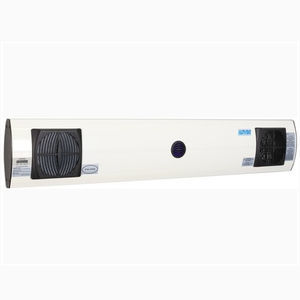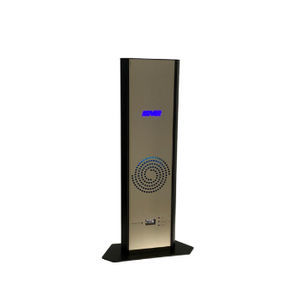
UV disinfection system GENIUS 485J CTI wall-mountedtabletopwith germicidal lamp
Add to favorites
Compare this product
Characteristics
- Disinfection procedure
- UV
- Configuration
- wall-mounted, tabletop
- Options and accessories
- with germicidal lamp
Description
Airborne disinfection device using UVGI (Ultraviolet Germicidal Irradiation).
Réduction of the microbiological air contamination in highest safety conditions
presence of personnel.
The illustration évidences the doses of ultraviolet radiations necessary to destroy different microrganisms.
As we can see, the fungine spores are obviously the most résistant species, compared to viruses and bacteria.
Aspergillus niger and Rhizopus nigricans are the spores more résistant to the short wave length ultraviolet radiations.
Penicillium is 10 times more sensible, while Cladosporium and Aspergillus flavus can be eliminated just with half dose used for more résistant spores.
MICROBIOLOGICAL ANALYSIS
The goal of this analysis has been the évaluation of UV STERIL AIR SYSTEM - GENIUS 4853 CTI efficacy in the air sterilization process and the lasting of its effect.
For the experiment it has been prepared a room hermetically closed; the volume of the ambience is about 38 m3 (5x3x2,5m).
The room has been sterilized before every trial, to avoid crosscontaminations during the analysis.
Resistant fungine species have been used for the experiments.
Then the room has been contaminated atomizing biological suspended particles with a sprayer called “ULTRALITE" that atomizes particles with diameter from 20 to 80fim, situated in the middle of the room, at about 2,5 m distance from UV STERIL AIR SYSTEM -
GENIUS 4853 CTI.
The Controls have been done with system “S.A.S, super 90" (International PBI, Milan) which can inspirate wellknown air volumes.
Catalogs
No catalogs are available for this product.
See all of KOVER SRL‘s catalogs*Prices are pre-tax. They exclude delivery charges and customs duties and do not include additional charges for installation or activation options. Prices are indicative only and may vary by country, with changes to the cost of raw materials and exchange rates.



